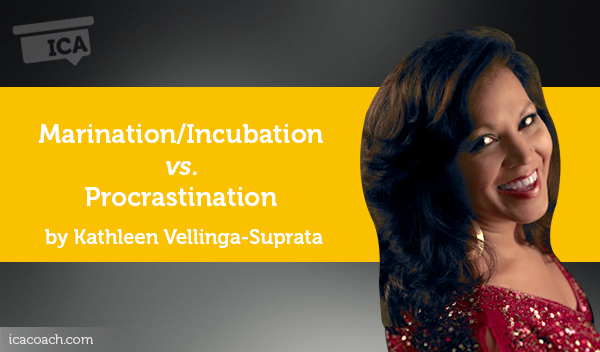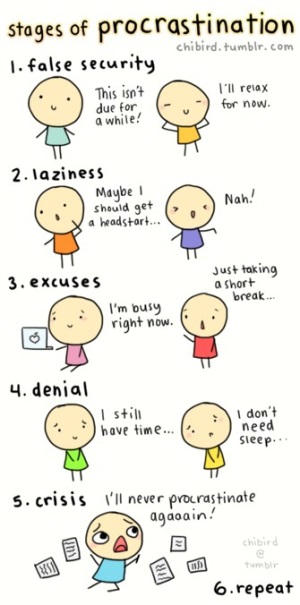
A Coaching Power Tool Created by Kathleen Vellinga-Suprata
(Creative Life Coach, UNITED STATES)
“It seems as if I’m procrastinating, but I’m really not!” my client, Suzy – a self-employed graphic designer – exclaims, as she describes her anxiety about finishing an important project on time. So, if she is not procrastinating, then what is happening exactly? We move towards creating awareness about the project.
“So, Suzy, tell me more about how this project has gone, from the beginning.”
“I was really excited about it and started the preliminary work immediately. I have been acutely aware of the deadline and now I can’t believe it’s only two weeks away!”
“How confident are you that the work will get done on time?”
“Well, pretty confident. I have yet to miss a deadline.”
“So you started the preliminary work and then…?”
“It felt like I had a few really good ideas, but I didn’t want to commit to one specific design just yet. So, I put it on a back burner and have only now gotten back to it.”
“I see…so in the time it’s been on a back burner, you’ve been working on other projects?”
“Well, not really. I feel like I’ve been goofing off, to be honest. Taking the dog for extra walks in the park, enjoying long lunches with friends, researching my upcoming vacation. I’ve been doing everything except my project!”
“Okay, shall we take a closer look at that? So, you’re saying that all this time, doing all these different activities, you haven’t thought about your design?”
“Sure I have! I’m always thinking about it. If I could just make myself sit down and get it done, it’s going to be perfect!”
“So, what I am hearing you say is that 1) you are confident the work will get done time, 2) you are confident the quality of your work is definitely going to reach your highest standards, and 3) you are not avoiding thinking about the project. And you are not procrastinating. How would you describe what this process has been for you?”
I can almost hear Suzy smile on the other end of the phone. “It’s just the way I allow my ideas to take form, first in my imagination, in my thoughts, in my dreams. And when I’m ready to see them on paper, I draw.”
In other words, Suzy has allowed her ideas to creatively marinate. I first heard – and fell in love with – the term ‘marinate’ used in an other-than-foodie context, in a movie called “Kissing Jessica Stein” (2001). Jessica feels put on the spot to make a decision about going out with Helen, to which Helen suggests “Just let it marinate for awhile”. The idea that one may allow decisions, projects and creative juices simply simmer for a while, without necessarily having to take immediate action or even, to appear to take action, is a creative process I had always embraced but found difficult to describe. Marination refers to the phenomenon many of us experience at one time or another when we ponder a problem for days and then “suddenly” realize the solution while taking a shower, or upon waking after a good night’s rest. Or perhaps we have an upcoming interview we would really like to shine on, and haven’t quite identified how best to prepare for it. Then, one day while taking a long drive alone in our car, we know, without a doubt, the exact words to say, the perfect questions to ask, clearly and distinctly. Creative marination involves the intuitive process that quite often leads to meaningful insights, the ‘a-ha’ moments we await, or simply, the successful outcome of a desired opportunity.
Recently, psychologists and coaches alike refer to this creative marination (my preferred term) as ‘incubation’, one of the four proposed stages of creativity (preparation, incubation, illumination, and verification).1Seabrook and Zoltan2 define incubation as ‘a process of unconscious recombination of thought elements that were stimulated through conscious work at one point in time, resulting in novel ideas at some later point in time.” In their meta-analytic review investigating whether incubation enhanced problem-solving, Sio and Ormerod3 found that ‘incubation substantially increases the odds of solving a problem, and benefits from long incubation periods with low cognitive workloads.’ Several studies describe short time periods of incubation as ‘mind-wandering’, ‘spontaneous thought’, and ‘task-unrelated thought’4. Others have focused on the mechanics or causes of incubation effects: is it the absence of conscious thought that stimulates creativity, or are there unconscious processes taking place during incubation that support creative thinking?5 It is wonderfully encouraging to know that scientists – academic and otherwise – are asking in abundance – these and other such questions, understanding that creativity is and has always been an important asset to so many areas of our lives.
In coaching, the knowledge that a creative marination period is not only confirmed but is also frequently recommended allows for insightful perspectives, especially when it pertains to procrastination (to defer action or delay). In our success-driven society, procrastination is often pejoratively characterized, belittling inaction and thus, rewarding action. When a client describes an experience in terms of procrastination, there are several coaching approaches that might be appropriate. Since the emotions of fear and anxiety usually accompany procrastination, it is helpful to create awareness around the experience, as I did in Suzy’s case. In her situation, Suzy recognized that she was simply in her marination period, incubating ideas until one was ripe and she was ready to commit to a design. Suzy’s fear and anxiety lessened considerably as her confidence increased, based on past positive experiences and a better understanding of her creative process.
 Creating awareness may also indicate a client is, indeed, procrastinating. A client’s past experiences may have been less positive, triggering underlying and limiting beliefs and associated bad habits. Powerful questioning surrounding the particular task (i.e. is it something you want/enjoy/like/need/know how to do, do you have a detailed strategy to get there, who can help you with this) or about the anticipated finished work (i.e. is there a benefit to you, are you standing in your power or pleasing someone else, in the grand scheme of your life, why does this matter) may release insights into a client’s expectations.
Creating awareness may also indicate a client is, indeed, procrastinating. A client’s past experiences may have been less positive, triggering underlying and limiting beliefs and associated bad habits. Powerful questioning surrounding the particular task (i.e. is it something you want/enjoy/like/need/know how to do, do you have a detailed strategy to get there, who can help you with this) or about the anticipated finished work (i.e. is there a benefit to you, are you standing in your power or pleasing someone else, in the grand scheme of your life, why does this matter) may release insights into a client’s expectations.
Reframing perspective by using procrastination proactively may also be found beneficial. In “Thinking Fast and Slow”, Daniel Kahneman6 suggests that in very complex situations, procrastination can become a powerful decision-making tool. Positive acknowledgement of a client’s intuitive slowing down of the process for the purpose of a deeper understanding of the task, for example, may increase confidence in the creative process. Action steps such as the deliberate weighing of pro’s and con’s of a decision, or the listing of priorities for a task moves a client closer to his goal. Taking time to better understand the reasons for delay may ultimately unlock doors to productivity and creativity.
Most certainly, procrastination may also be reframed as the art of marination or incubation and therefore, as a strength. Identifying positively as a creative thinker, allowing the incubation process to continue unconsciously, may stimulate supportive new habits (meditation, taking long walks, creative brainstorming lunches). Coaching an incubation period invites its own creative questioning, i.e. how can you create more value with less effort, how are you experiencing this emotionally, how does this feel energy-wise, what observations have you made this week, what do you feel you need less/more of. The widespread acceptance of marination/incubation as a confirmed creative process supports clients as well, by clearly defining their inactivity or delaying action in a positive light. When pressure – self-induced or otherwise – to appear productive is alleviated, ideas and thoughts can marinate, unencumbered by fear or anxiety.
One of the greatest benefits of coaching around marination/incubation vs procrastination is experienced when we invite our clients to connect with the element of trust in their own creative process. Trust is so closely related to intuition. Since creative marination is an intuitive process, knowing when to trust one’s own process can help to develop self-trust as the most powerful tool of all. Inviting a client to describe, for instance, how he knows he is not avoiding a task, creates an opportunity to look at his ‘knowing’ on a deeper level. He knows he is not just being lazy, he knows he is being honest with himself, he knows he’s just allowing his ideas to simmer unconsciously. He knows this and he trusts this. Simply allowing a client to share such truths in a non-judgmental space, and then hearing his own words reflected back to him, allows a tangible connection to self-trust that – with time and experience -will be further cultivated and strengthened.
In summary, a multitude of benefits can be achieved when this power tool – marination/incubation vs procrastination – is used to enlighten and lighten the creative process. A better awareness and understanding of the creative process may reduce stress, fear, and anxiety around a task. Creativity may find ‘permission’ to unleash itself, unconsciously. Smaller action steps may replace creative paralysis, while keeping the “bigger picture” (motivation, value, etc) in mind. Coaching with this power tool uniquely encourages the opportunity to reflect deeply on one’s own creative process, while allowing that muscle we call ‘trust’ grant us the greatest benefit of all. Intuitively knowing if and when we are procrastinating allows us to use procrastination proactively. When we are free to trust the process, we are free to creatively marinate; when we are free to marinate, we are free to create. And, ultimately, by creating productively and efficiently, we reaffirm our trust in our creative process.\
Resources
1 Christensen, T.Bo (2005). Creative Cognition: Analogy and Incubation. Department of Psychology, University of Aarhus, Denmark.
2 Seabrook, Rachel (Oxford Brookes University) and Dienes, Zoltan (Sussex University). Incubation in Problem Solving as a Context Effect at http://www.lifesci.sussex.ac.uk/home/Zoltan_Dienes/Seabrook%20&%20Dienes%2003.pdf
3 Sio, Ut Na and Ormerod, Thomas C. (Lancaster University) Does Incubation Enhance Problem Solving? A meta-analytic review at
4 Fox KC, Spreng RN, Ellamil M, Andrews-Hanna JR, and Christoff K (2015). The wandering brain: metaanalysis of functional neuro-imaging studies of mind-wandering and related spontaneous thought processes at http://www.ncbi.nlm.nih.gov/pubmed/25725466
5 Ritter, SM and Dijksterhuis, A (2014). Creativity-the unconscious foundations of the incubation period at http://www.ncbi.nlm.nih.gov/pmc/articles/PMC3990058/
6 Kahneman, Daniel. Thinking Fast and Slow. Farrar, Straus, and Giroux, LLC, 2011.